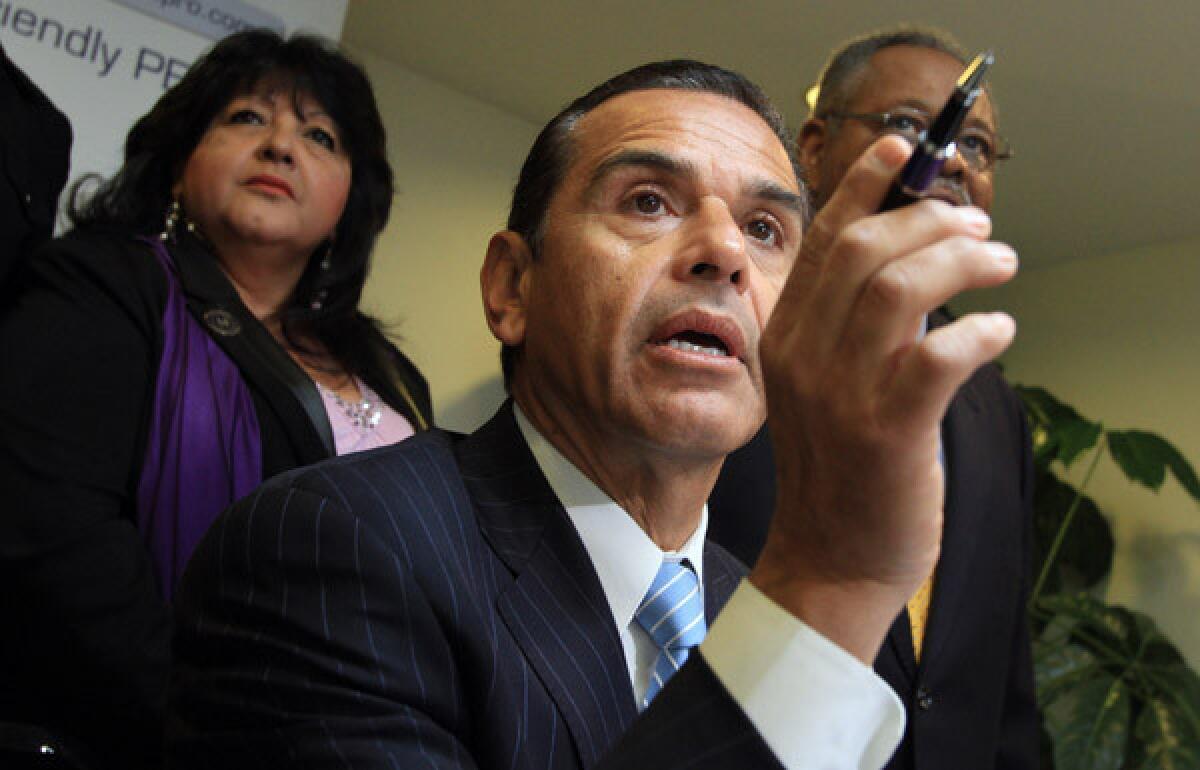Villaraigosa says improving economy may cut L.A.’s budget gap

- Share via
Two days after Los Angeles voters defeated a sales tax hike that officials had said was vital to reducing the city’s budget crisis, Mayor Antonio Villaraigosa said stronger revenues and an improving economy could cut this year’s financial gap by more than half.
Villaraigosa, who endorsed the plan to take the sales tax from 9% to 9.5%, said Thursday that he now expects a brighter financial outlook to take a looming deficit from $216 million to a much lower number, possibly less than $100 million, for the fiscal year that starts July 1.
“The economy’s getting better,” he said. “So I don’t expect that we’re going to have draconian cuts.”
Voters on Tuesday rejected Proposition A, which would have generated more than $200 million annually. A day later, City Administrative Officer Miguel Santana, the top budget official, promised to submit a list of potential budget cuts — and said reducing the size of the police force and funding for street repairs should be “back on the table.”
Villaraigosa said he discussed the city’s improving budget picture last week with a group of Los Angeles County economists. Mayoral spokesman Peter Sanders said he’s “not sure why” Villaraigosa did not share his encouraging numbers earlier. But Santana, who advises the mayor and the council, said it was still too soon to revise his estimate of the budget gap.
“Last year we had a last-minute drop in property tax growth due to the assessor changing his projections,” he said in an email. “We also don’t know all the expenditures yet.”
Villaraigosa will present his final budget next month. He will leave office June 30 after serving eight years.
The mayor’s financial analysis bears a striking resemblance to comments made last month by his onetime budget advisor, former Deputy Chief of Staff Matt Szabo. Then a candidate for City Council, Szabo said the shortfall was $100 million lower than the figure being used publicly by proponents of Proposition A.
Szabo, who opposed the sales tax hike, noted that Santana’s own report said pension costs were $45 million lower than previously forecast and other revenue as much as $70 million higher. When The Times asked the mayor about Szabo’s remarks a day later, Villaraigosa accused the reporter of trying to create a controversy.
On Thursday, Villaraigosa was upbeat. “I expect things are going to be a little brighter than one might have thought,” he said.
Much of the Proposition A campaign was built around warnings that more money was urgently needed to cover police, fire and paramedic services. Appearing in a TV ad for the ballot measure, Police Chief Charlie Beck said public safety services were in danger. He also warned that the city would have to reduce the size of the Los Angeles Police Department by 500 officers — 200 through layoffs — without the additional tax revenue.
Stuart Waldman, president of the Valley Industry and Commerce Assn., said Villaraigosa’s remarks made it clear that the city didn’t need the half-cent sales tax hike. Waldman’s group was opposed to Proposition A and had argued that the city should pursue other cost-saving measures, such as privatization of the zoo and convention center.
“I never believed they were going to reduce any officers,” Waldman said.
Asked about Beck’s police layoff warning, Villaraigosa said the city still faces tough budget years in the future, in large part because of rising retirement costs for city employees. Those costs mean that every employee, including police officers and firefighters, should contribute more toward those benefits, he said.
“We’ve got to do more. That’s just a fact,” he said.
Even with the rosier budget outlook, one lawmaker said the city should start trimming the number of LAPD officers, if only to prepare for the financial gap expected in July 2014. Councilman Paul Koretz said the city should halt police hiring now and revisit the issue in May, when the council takes up Villaraigosa’s annual budget proposal.
“Even if [the shortfall] winds up being around $100 million, it’s not like that’s wonderful,” he said. “That’s still $100 million from a budget that’s already bad, and has been cut to the bone.”
More to Read
Sign up for Essential California
The most important California stories and recommendations in your inbox every morning.
You may occasionally receive promotional content from the Los Angeles Times.











